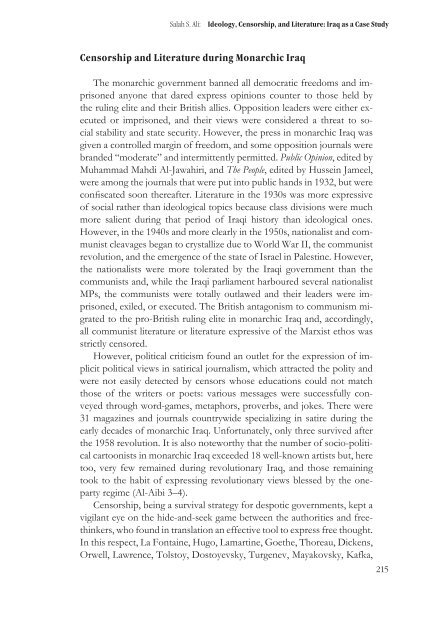Literatura in cenzura - Društvo za primerjalno književnost - ZRC SAZU
Literatura in cenzura - Društvo za primerjalno književnost - ZRC SAZU
Literatura in cenzura - Društvo za primerjalno književnost - ZRC SAZU
- No tags were found...
Create successful ePaper yourself
Turn your PDF publications into a flip-book with our unique Google optimized e-Paper software.
Salah S. Ali:Ideology, Censorship, and Literature: Iraq as a Case StudyCensorship and Literature dur<strong>in</strong>g Monarchic IraqThe monarchic government banned all democratic freedoms and imprisonedanyone that dared express op<strong>in</strong>ions counter to those held bythe rul<strong>in</strong>g elite and their British allies. Opposition leaders were either executedor imprisoned, and their views were considered a threat to socialstability and state security. However, the press <strong>in</strong> monarchic Iraq wasgiven a controlled marg<strong>in</strong> of freedom, and some opposition journals werebranded “moderate” and <strong>in</strong>termittently permitted. Public Op<strong>in</strong>ion, edited byMuhammad Mahdi Al-Jawahiri, and The People, edited by Husse<strong>in</strong> Jameel,were among the journals that were put <strong>in</strong>to public hands <strong>in</strong> 1932, but wereconfiscated soon thereafter. Literature <strong>in</strong> the 1930s was more expressiveof social rather than ideological topics because class divisions were muchmore salient dur<strong>in</strong>g that period of Iraqi history than ideological ones.However, <strong>in</strong> the 1940s and more clearly <strong>in</strong> the 1950s, nationalist and communistcleavages began to crystallize due to World War II, the communistrevolution, and the emergence of the state of Israel <strong>in</strong> Palest<strong>in</strong>e. However,the nationalists were more tolerated by the Iraqi government than thecommunists and, while the Iraqi parliament harboured several nationalistMPs, the communists were totally outlawed and their leaders were imprisoned,exiled, or executed. The British antagonism to communism migratedto the pro-British rul<strong>in</strong>g elite <strong>in</strong> monarchic Iraq and, accord<strong>in</strong>gly,all communist literature or literature expressive of the Marxist ethos wasstrictly censored.However, political criticism found an outlet for the expression of implicitpolitical views <strong>in</strong> satirical journalism, which attracted the polity andwere not easily detected by censors whose educations could not matchthose of the writers or poets: various messages were successfully conveyedthrough word-games, metaphors, proverbs, and jokes. There were31 magaz<strong>in</strong>es and journals countrywide specializ<strong>in</strong>g <strong>in</strong> satire dur<strong>in</strong>g theearly decades of monarchic Iraq. Unfortunately, only three survived afterthe 1958 revolution. It is also noteworthy that the number of socio-politicalcartoonists <strong>in</strong> monarchic Iraq exceeded 18 well-known artists but, heretoo, very few rema<strong>in</strong>ed dur<strong>in</strong>g revolutionary Iraq, and those rema<strong>in</strong><strong>in</strong>gtook to the habit of express<strong>in</strong>g revolutionary views blessed by the onepartyregime (Al-Aibi 3–4).Censorship, be<strong>in</strong>g a survival strategy for despotic governments, kept avigilant eye on the hide-and-seek game between the authorities and freeth<strong>in</strong>kers,who found <strong>in</strong> translation an effective tool to express free thought.In this respect, La Fonta<strong>in</strong>e, Hugo, Lamart<strong>in</strong>e, Goethe, Thoreau, Dickens,Orwell, Lawrence, Tolstoy, Dostoyevsky, Turgenev, Mayakovsky, Kafka,215
















